Breaking Free: Women of Spirit at Midlife and Beyond
ed. Marilyn Sewell
Beacon Press 2004
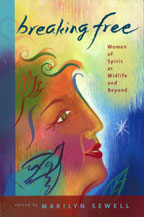 “Life does not accommodate you, it shatters you. It is meant to, and it couldn’t do it better. Every seed destroys its container, or else there would be no fruition.”
“Life does not accommodate you, it shatters you. It is meant to, and it couldn’t do it better. Every seed destroys its container, or else there would be no fruition.”
This is a quote written by Florida Scott Maxwell, from the book Breaking Free: Women of Spirit at Midlife and Beyond. This line most struck me as truly encapsulating the experience that reading it brings. Breaking Free is edited (and contributed to) by Marilyn Sewell and consists of a compilation of twenty-seven women’s personal narratives about the process of growing older. The women come from diverse backgrounds – religious, cultural, ethnic – and are all eloquent wordsmiths.
This collection is separated into two parts: “Necessary Losses” and “Breaking Free,” where each part weaves together stories that together link up the experiences of loss, grief and pain with those of freedom, joy and beauty.
In reading this book I felt very deeply the writers’ experience of the world as beauty and pain, as beauty in pain. For me, this book was less about being a middle-aged woman as it was about simply being a human being and growing from any phase in one’s life to another.
As I continue to maneuver my way from youth into adulthood, I become increasingly aware of the way that the natural, seemingly innate process of growth enables me to let go of the drama, the indecision and the everyday heartbreaks that plagued me in my younger years. In the stories of these women, I saw an acknowledgement of and gratitude for what they were able to leave behind from their youth, but also a sort of weary peace from finally resolving the paradoxes and making up their minds. It was as if life did not seem to be as much of a mystery for them anymore.
When initially beginning this book, I was expecting to be told about how great it is to be “old”; that old age would be idealized and presented through rose-coloured lenses. Instead, I found intentional contradictions to that discourse: Baba Cooper’s rebellion against the stereotype of “grandmother-hood”; Annick Smith’s disappointment and humility upon realizing she could now no longer take the same chances as could her younger self; Erica Jong’s struggle with the difficulties of dating and sex after the age of fifty.
Breaking Free is a contemplative, thought-provoking work about the transformative experience of being human, and it delves into the visceral, intangible, infinitesimal and earth-shattering events that shape our lives. This book showed me, in its intimately personal and uplifting style, that it’s okay to be young, that it’s wonderful even, but that it isn’t everything. –Monica Farrell
back to top
A Man Without a Country
Kurt Vonnegut
Seven Stories Press 2005
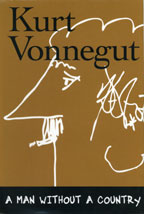 Kurt Vonnegut’s socialist politics and humanist beliefs were inherited from his family and brewed in his experiences of the Great Depression and Second World War. When the American economy took a nosedive, Vonnegut saw a time of potential, when radical politics based on social and economic justice was a real possibility. Vonnegut has been disappointed ever since, and A Man Without a Country is a collection of simple humorous essays that express his views on a world he has seen transform over and over in his eighty-two years.
Kurt Vonnegut’s socialist politics and humanist beliefs were inherited from his family and brewed in his experiences of the Great Depression and Second World War. When the American economy took a nosedive, Vonnegut saw a time of potential, when radical politics based on social and economic justice was a real possibility. Vonnegut has been disappointed ever since, and A Man Without a Country is a collection of simple humorous essays that express his views on a world he has seen transform over and over in his eighty-two years.
“Do you realize that all great literature… are all about what a bummer it is to be a human being? (Isn’t it such a relief to have somebody say that?)”
Vonnegut has no delusions of life as a rosy-coloured happy place, or visions of a brighter future in store, but his writing is never despairing, nor his humour em-bittered. In his cynicism he stares into the face of all the pain and all the inescapable black stuff of life, and he expresses compassion that finds a way to get through it all. Vonnegut has seen life in the darkest of horror, and it is not vain hopes or passing pleasures that get us through, but simply the acknowledgement that this is a sad place to be. The first noble truth of the Buddhist dharma is that life is suffering. This is a notion that can be hard to accept, because we hold on to our hopes for the satisfaction of our desires, but in A Man Without a Country Vonnegut shows how such acceptance is an act of compassion, and a source of light-heartedness and humour.
Vonnegut does not really break new ground in terms of his political and social message. He repeats the simplest things that we all know: “war is unspeakable”; we have “crucified planet Earth” in our oil-guzzling “transportation whoopee”; and George W. Bush is a “dangerous moron.” It may only be a repetition of the simplest rules, but they need to be repeated. The world is still bloodthirsty, choking on exhaust and governed by “psychopathic personalities.” The world is insane, and it is such a relief to have somebody say that.
I don’t know if A Man Without a Country is a majestic work of literary genius, but it is a humble gift. Vonnegut currently stands at the end of his career and of his life, and he seems to be striving for nothing grand, but expressing his mind with clarity and gentle humour. A Man Without a Country is simple, but only a real master could pull off such simplicity and be so deeply touching at the same time. – Ian Cant
back to top
An Unreasonable Woman:
Diane Wilson
Chelsea Green Publishing 2005
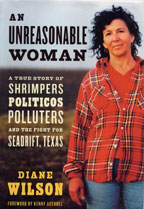 I didn’t know I was looking for inspiration until I found it in the life and words of Diane Wilson, the author and so-called unreasonable woman of the book of this same title.
I didn’t know I was looking for inspiration until I found it in the life and words of Diane Wilson, the author and so-called unreasonable woman of the book of this same title.
An Unreasonable Woman is Wilson’s tale of her life as a shrimper in San Antonio Bay off the coast of Calhoun County, Texas, and her fight to keep the waters clean. More subtly, it is the story of her life as a mother, a daughter, a wife, a sister and a friend. It is the story of her seemingly fateful transformation from someone without a voice, who didn’t care to know much beyond a quiet day alone on her skiff, to someone who was willing to die fighting for what had always sustained her life and brought meaning to it: the sea.
Wilson’s battle is with the chemical plant Formosa Plastics, an economic “hungry ghost” and persistent violator of Texas’ Clean Water Act. She’s fighting a belief system that chooses death over life, a decision by the powers that be to pollute rather than choose the completely feasible alternative of zero waste discharge, simply because it is cheaper and easier, and legal, to do so. This, to Wilson, is unreasonable, and leads her to react in her own “unreasonable” manner.
What is unreasonable? Is it unreasonable to do anything and everything you can possibly think to do, to risk your own life, to risk ostracizing yourself from your family and your community, in order to fight for the one thing you have known and loved, the thing that has sustained you all your life, the very thing that has brought meaning to your life? Wilson asks if it is simply life or a life with meaning that matters. Is it more important to search for meaning, and when you have found it to be willing to die and bleed for it, or is it just better to breathe?
Wilson doesn’t answer these questions for us, but her actions answer them for herself. Her willingness to die and bleed for the meaning she has discovered in her life was where I found inspiration, the inspiration to look at my own life and ask: Where is my reason for living? – Melissa McBride
back to top
The Tibetan Book of Yoga
Geshe Michael Roach
Doubleday 2004
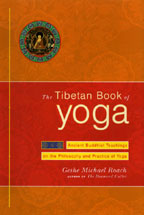 There are two loves in my life: Ashtanga Yoga and Tibetan Buddhism. For years I have been developing separately in these two very different yogic traditions. When I was with one, I felt disloyal to the other. One is intensely physical, working on the body from the outside in, and the other is subtle, mentally working for the benefit of all beings quietly from the inside out.
There are two loves in my life: Ashtanga Yoga and Tibetan Buddhism. For years I have been developing separately in these two very different yogic traditions. When I was with one, I felt disloyal to the other. One is intensely physical, working on the body from the outside in, and the other is subtle, mentally working for the benefit of all beings quietly from the inside out.
Upon reading The Tibetan Book of Yoga I felt liberated. Finally my two loves united. The book combines the ancient art of an India-based yoga class with an internal Buddhist yoga practice of tong-len – special ways of thinking of others.
The practice of Tibetan Heart Yoga has its roots in India, similar to other yoga traditions, and has been passed down for hundreds of years through teachers in the Gelukpa tradition of the Dalai Lamas. The Indian system of asana poses was combined with a 2000-year-old tradition of tong-len that dates back to the Buddha himself. These two systems merged in the time of Jey Tsong Khapa (1357–1419), creating what is known as Tibetan Heart Yoga.
Tong-len, translated as “giving and taking,” is a set of instructions for opening your heart to others. For example, during a seated pose, you are instructed to bring your attention to your heart centre and think of someone you love whom you know is going through a hard time. Then you are to imagine that all the pain this person has is gathered into a little pool of darkness at his or her heart. While taking deep breaths, imagine the little cloud of darkness moving up and out of their body.
Many of the poses selected in the book work on the heart centre. Tibetans believe the physical body actually rests not on a bony skeleton, but on an energetic skeleton. When the body is healthy, they believe energy flows freely through all its energy channels. The centre of the energetic skeleton is the heart centre, so it is the most important area to keep open. Opening the heart helps the flow of good thoughts and nourishes the body.
Like trying to learn how to dance or fly from a book, the Tibetan Book of Yoga has its limitations. It is difficult to get into the yoga practice when you have to keep referring back to the book, especially with so many details on what exactly you should be visualizing. However, all the information is there if you want to try it on your own.
At the most basic level, it is a great introductory book to learn the theory behind an internal yoga practice and the effect it has on your mind and body. Tong-len is an internal practice that can be added to your existing yoga practice or even while you are sitting on the bus. – Samantha Kay McDonald
back to top
Pronoia Is the Antidote for Paranoia: How the World Is Conspiring to Shower You with Blessings
Rob Brezsny
Frog Ltd. 2005
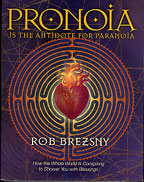 “Channel your inner wise ass.”
“Channel your inner wise ass.”
To me these were the most encouraging words I came upon in Pronoia Is the Antidote for Paranoia. Rob Brezsny is the author of “Free Will Astrology,” the most widely syndicated astrology column in North America. With Pronoia, his third book, Brezsny preaches the virtues of optimism with anecdotes, quotes, facts, articles and workbook-like exercises (he encourages the reader to write in the book itself). My initial impression of Brezsny’s theory of “how the whole world is conspiring to shower you with blessings” seemed a little too idealistic even to me. “What about all those diseases, wars and disasters? Are they blessings, too?” I wondered.
Pronoia is put together in a nonlinear fashion for casual perusal. The author suggests several options for navigating through Pronoia. One is to start reading somewhere in the middle and then skip around here and there, “trusting your instincts to find exactly what you need, exactly when you need it.” Another directive is to “commune with the book as if it were made of music.”
I decided to read the book the traditional way, from the beginning. With a lengthy and warm introduction, Brezsny states that “you’re alive because of love. You’re made of love.” Brezsny does his best to show the reader the positive things that go unnoticed every day that can be seen as blessings. After about fifty pages I started to skim through to see what else lay in store for me. I flipped through, stopping at whatever caught my eye. It really was refreshing to open up the book at any random page (is anything really random?) for some insightful, if not humorous, inspiration. I found a lot of useful bits this way, all interconnected in some shape or form. All exercising the forces of pronoia.
Thankfully, some pages throughout the book were “liberated for my use” – to take notes, to doodle, to become the “co-author” – while other pages were reserved exclusively for “sacred advertisements” such as this pronoiac testimony from Tom of Ohio: “I am a devout atheist, but I have to explain to my atheist friends that I do pray to the ‘GodIdontbelievein.’”
Later on, once I got to the chapter entitled “When did you first realize you are the rain’s teacher?” I started to question the seriousness of the book itself. Perhaps it is an important question, but I hadn’t even realized, until that moment, of course, that I was in fact the rain’s teacher! Has Brezsny somehow channeled his inner wise ass right into the book? I think he has done exactly that: using his creative energy, his wit and undying optimism to focus on helping others feel good about themselves and the world around us. – Lelsie Schachter
back to top
MAO: The Unknown Story
Jung Chang and Jon Halliday
Knopf 2005
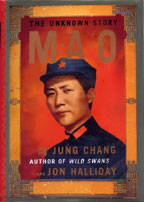 The eminent political theorist Hans Morgenthau once said that it is in the nature of states to seek power above all. “Politics,” he said, “is a struggle for power. Whenever people strive to realize their goal by means of politics they do so by striving for power.”
The eminent political theorist Hans Morgenthau once said that it is in the nature of states to seek power above all. “Politics,” he said, “is a struggle for power. Whenever people strive to realize their goal by means of politics they do so by striving for power.”
Nothing I’ve read in recent memory encapsulates Morgenthau’s idea more completely than Jung Chang and Jon Halliday’s massive histo-biography of China’s “Great Helmsman,” Mao Tse-Tung. The “unknown” story they tell thoroughly shatters the myth of Mao, which no doubt needed to happen. But whether their story has integrity or not is another matter. In spite of staggering research and an immense bibliography, the bitter tone permeating almost every page undermines the authors’ credibility.
In the first sentence of the opening paragraph, Chang and Halliday claim that Mao Tse-Tung was “…responsible for well over 70 million deaths in peacetime, more than any other twentieth-century leader.” The remaining 800 pages of this depressing account are devoted to proving this claim, and while the story they tell is deeply disturbing and needs to be taken seriously, I am left with a nagging feeling of doubt.
At times Chang and Halliday seem unable to resist embellishing fact, or what is presented as fact about Mao’s personal and public life, with sarcasm and innuendo. At the beginning of the Long March, for example, Mao informed his wife, Guiyuan, that no children could be taken along. As a result, his two-year-old son had to be left behind and Mao never saw him again. The authors conclude the anecdote with the comment that “…Mao showed no particular sadness about leaving Little Mao behind, and did not even say goodbye to his son. His sorrow was reserved for himself.” Well, perhaps that was so, but perhaps not. How can one truly know how Mao felt in the chaos of the moment? That Jung Chang especially has a right to harbour bitterness toward Mao is not in question; the Cultural Revolution almost literally destroyed her parents. But on a strictly factual basis the story of Mao is devastating enough – it doesn’t need to be reinforced with further negativity.
I don’t think anyone has ever seriously disputed the fact that Mao was a tyrannical despot of horrendous proportion. Given the historical and political realities of the time, he was in good company. With the deaths of the dowager empress and her impotent son in the early 1900s, dynastic rule ended and China, now rudderless, was up for grabs. Centuries of insularity had made the country extremely vulnerable.
Across the land, tyrants, despots, warlords, imperialists and power brokers of all shades and nationalities fell over each other to get to the trough. European-owned railways built by coolie labour staked out the territory for future exploitation. To the north, Russia, already stung by the Crimean War, sought to turn China into a blockade against future Japanese invasion. Far to the west, Standard Oil of New Jersey was busy affirming my mother’s adage to me as a child that if I dug down deep enough in our backyard, eventually I’d come out the other side and find myself in the heart of Qinghai Province. In spite of the Boxer Rebellion of 1900 and later the Wuchang Uprising in 1911, it seemed that everyone but the Chinese was poised to claim the spoils.
This was China in the early part of the century, and the ensuing struggle for domination of that great country set the stage upon which Mao and the Chinese Communist Revolution played their parts. In the end, at unimaginable cost, Mao and the Chinese people won out. But if it hadn’t been Mao, it would have been someone else—Chiang Kai-shek and his in-laws, for example, who single-mindedly devoted themselves to converting the chaos into American dollars to finance their own ends.
Mao outlasted them all in his lifelong quest for global revolution. But without some sense of the larger historical context that spawned the revolution—a context that Chang and Halliday fail to provide – Mao inevitably comes across as the worst of a bad lot. Maybe he was, and maybe that’s what the quest for political power really is all about. But thirty years after Mao’s death, it doesn’t seem to matter much what was driving him. China today is extremely focused on taking over the world in ways that Mao, from an ideological perspective, would probably find utterly astonishing.
In order to gain a balanced historical perspective of China, the “unknown” story ought to be told, and given their respective qualifications both authors were in a good position to tell it. But I think they let personal feelings influence their judgement far too much. What’s missing from this book is the kind of balanced, reasoned assessment that recorded history needs if it is to be trusted and relevant. Unfortunately, this work creates a new myth in place of the old. Instead of a saviour, we now have a monster, and it’s hard to know what to do with it. – Swami Gopalananda
back to top
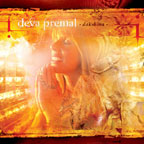 I first heard Deva Premal at massage therapy school, where we would repeatedly practise to her CDs. I became quite fond of her voice and the soothing effect it had on clients. Once again, Premal’s latest musical offering, Dakshina, will surely be well received at massage tables and yoga studios.
I first heard Deva Premal at massage therapy school, where we would repeatedly practise to her CDs. I became quite fond of her voice and the soothing effect it had on clients. Once again, Premal’s latest musical offering, Dakshina, will surely be well received at massage tables and yoga studios.
Deva Premal’s CDs have a timeless charm that allows you to listen over and over again without tiring of them. Like returning home, mantra can bring us to a transcendent place within ourselves. Fused with Premal’s remarkable voice, we are delivered exactly there.
Created by Premal and her partner Miten, Dakshina is a fine blend of reflective, sacred music. Dakshina is Sanskrit for an offering made to one’s guru. This could be the outer or inner guru. Premal, however pays specific homage to her teacher Osho, previously known as Rajneesh.
Deva Premal uses mantra skillfully in Dakshina. Mantras are useful tools for focusing the mind and manifesting desirable qualities. She opens the CD with “Om Hraum Mitraya” – an invocation and tribute to noble friendship: “I bow to Saraswati, the Goddess of music, art and Divine speech.” Heartfelt, the mantra is blended with flute, strings and tabla. And so Premal, with Saraswati’s blessing, creates a gracious space for the rest of the album to flow from. Then without pause Premal moves into an upbeat celebration of Siva, the destroyer of illusion and ego, with “Om Namah Shivaya.”
My favourite, “Homage to Krishna,” is perhaps the most seductive piece on the CD. We can’t help feeling the Divine longing through Premal’s exceptionally silky vocals, entwined with Krishna’s musical instrument of choice – flute. Meditating with the song evokes the feeling that we must, in fact, be one of Krishna’s lucky gopis.
For the most part, I like Dakshina. The songs are tapestries of traditional mantra, mesmerizing vocals, flute, percussion and orchestral arrangement. There were moments in the CD that seemed to have a little too much synthesized instrumentation for my liking, but overall the CD is fabulous and will certainly be well received by lovers of sacred song. – Jennifer MacIntyre
back to top
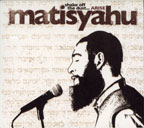 Several months ago, following a live show that was nothing short of phenomenal, I picked up a copy of Matisyahu’s debut disc, Shake Off the Dust… Arise. A self-described “Hasidic Reggae Superstar,” Matisyahu (aka Matthew Miller) is not your stereotypical, Bob Marley-esque reggae singer. At first I thought he was a gimmick, looking to make a quick buck as an artist of novelty and curiosity. One would never think that the seemingly reserved and guarded demeanour of most Hasidic Jews could be integrated with the open and expressive character of reggae. My skepticism, however, was quickly eliminated after my first encounters with him. I soon was infected by his seductive beat, unable to stop his music from racing through my mind, and myself from reflecting on his message.
Several months ago, following a live show that was nothing short of phenomenal, I picked up a copy of Matisyahu’s debut disc, Shake Off the Dust… Arise. A self-described “Hasidic Reggae Superstar,” Matisyahu (aka Matthew Miller) is not your stereotypical, Bob Marley-esque reggae singer. At first I thought he was a gimmick, looking to make a quick buck as an artist of novelty and curiosity. One would never think that the seemingly reserved and guarded demeanour of most Hasidic Jews could be integrated with the open and expressive character of reggae. My skepticism, however, was quickly eliminated after my first encounters with him. I soon was infected by his seductive beat, unable to stop his music from racing through my mind, and myself from reflecting on his message.
Matisyahu’s music has an incredible flow. His oscillating voice accords perfectly with the rhythms produced by his talented band. He infuses this with traditional Jewish sounds and religious themes. One thing is clear: the album is overtly and unabashedly religious. But this is not to its detriment. On the contrary, the great thing about this album is that you needn’t be Jewish or religious to appreciate its musical quality and sophistication. What this disc is really all about is one man expressing his love for God, pouring it out from the depths and essence of his being. The specific style of music is perhaps inconsequential, since it serves as merely a conduit for his praise.
Matisyahu’s lyrics are profound, intelligent, and in some cases, didactic. The opening track “Chop ’em Down” recounts much of the Biblical history of the Jews, ranging from Moses and Abraham to Egypt and David. Other tracks express more profound and mystic truths, inciting us to modesty and the recognition of the illusion of our personal selves. “King without a Crown” contains the following lines: “Strip away the layers and reveal your soul, keep yourself up and then you become whole, you’re a slave to yourself and you don’t even know…You say you want God but you can’t deflate your ego.”
On several tracks, he employs imagery and motifs related to the opposition between hunger and thirst, rejoicing in the way God fills him up and eliminates both his physical and metaphysical “thirst.” Matisyahu’s lyrics serve to remind us of the gift of existence and gratitude we should feel in every breath.
Matisyahu succeeds brilliantly in bringing together seemingly disparate aspects of religion and music, blending the words and sounds of his tradition with the style of reggae in a seamless euphony. In a society where the music industry mechanically manufactures commoditized sound, Matisyahu creates an original style that impressed me with its power and complexity.
It is truly remarkable that he can come from such an exclusionary and reclusive religious sect and present his beliefs in such an open and honest way. His work, however, can only help to open people’s minds and remove their prejudices and misunderstandings about his faith. Keep an open, tolerant and critical mind and you may find yourself converted. – Daniel Goldsmith
back to top
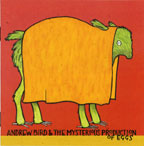 Many years ago I realized that my listening tendencies had changed and that I’d become particularly enthralled by solo musicians. There was just something about the solitary musician with the instrument that I found immediate and true. I would note the often subtle changes to their work – the way they’ve adapted a recurring metaphor to their new recording, the new timbre in their voice resulting from aging or extensive touring, or an unexpected cynical bite that had not been in their work previously.
Many years ago I realized that my listening tendencies had changed and that I’d become particularly enthralled by solo musicians. There was just something about the solitary musician with the instrument that I found immediate and true. I would note the often subtle changes to their work – the way they’ve adapted a recurring metaphor to their new recording, the new timbre in their voice resulting from aging or extensive touring, or an unexpected cynical bite that had not been in their work previously.
Perpetually solo and now signed to independent Righteous Babe Records (run by folk-rock troubadour Ani DiFranco), Andrew Bird emerged in 2005 with a damaged, offbeat album that both startles and soothes, while always maintaining its own personality. A classically trained violinist and, if the press release is correct, a professional whistler, Bird has merged his formal chops with a unique singer-songwriter sensibility. With a voice that is reminiscent of Jeff Buckley and Rufus Wainwright (both unique singer-songwriters in their own right) and lyrics that seem like free-associated couplets that create oblique impressions in the overall, Bird uses an easy, off-handed approach to belie what is clearly a refined, practised approach.
Songs will start with pizzicato arpeggios played on a violin, be complemented by melodies whistled or played on a glockenspiel, then join guitar riffs and vocal swells that tug and pull at the edges of the piece. The tracks are orchestral in places, spare in others, and make use of textures to create tension in the arrangements.
Most songs on The Mysterious Production of Eggs seem to show a sort of self-aware naïveté, like an adult looking back and reinterpreting childhood impressions of things, which allows Bird to create a suspended, timeless quality to the album through layers of simple melodies. Adding to his unique instrumentation, Bird also uses a sampling pedal, which allows him to record, layer and alter these elements in real time, without requiring other musicians. It truly is a solo act. I can vouch from first-hand experience that seeing this done live on-stage is an incredible display of musicianship, and it helps Bird form songs that are singular expressions of his unique view of things.
On paper, these instruments and sampling elements may read as gimmicks to mask artistic shortcomings. However, so elastic is Bird’s talent that he’s been able to utilize these tools into his overall expression seamlessly. At a time when music seems to regurgitate the same sounds endlessly, musicians like Andrew Bird show that idiosyncratic songwriters deserve more notice than they get. The Mysterious Production of Eggs may not be an album to everyone’s taste; however, it is one that deserves your attention simply for its uniqueness. Your simple heart will thank you.
– Scott W. Gray
back to top